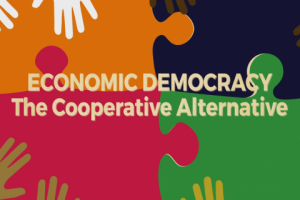COMParative eConomic sYstems
Design: You first view an online lecture (which can usually be listened to as podcast if you prefer) then undertake some suggested reading and then participate in either a 90 minute in-person or zoom discussion (with a short break at the 45 minute mark). Tutorial sizes have a maximum upper limit of 19 people and are typically a bit less than this in order to generate a conversational, easy-going and genuinely interactive experience. The lectures and readings are all downloadable and may be done whenever you like. On-one-one help is provided whenever you need to clarify anything.
Dates and times for discussion session.
Classes start in the third week of July 2025 and runs for nine weeks.
Choose between one (1) of the following options for the weekly discussion sessions.
Option 1. In-person
The first in-person weekly session starts Tuesday 22nd July 6 to 7.30pm (Aust East Standard time) at Prosper, Level 1, 64 Harcourt Street, North Melbourne.
Option 2. Online
The first zoom session starts Thursday 24th of July 6 to 7.30pm.
Option 3. Potential additional online session
A third discussion session can be scheduled that better suits those based in different time zones. It just requires a few people to agree on a suitable time. It is regularly the case that a suitable time can be found. Accordingly, feel free to submit and expression of interest that indicates what days and times would suit you and hopefully we organise a bespoke third tutorial that suits you and a few other people.
Cost (major currencies list below, contact us for other currencies or simply translate $AUD250 into any other currency)
Australian Dollars AUD$250
US Dollars US$170
Euros EUR150
UK Pounds GBP125
Payment can be made via electronic funds transfer, credit card, paypal or money order.
Registration Process
Upon your receiving your registration form, we will be in touch. Your confirmation of enrolment occurs on receipt your payment.
Refunds: If you attend the first class and find that for some reason it is not what you are seeking then we can provide you with a full refund – provided that we are notified within 7 days of your payment.
Assessment: There are regular questions and answers to allow you to self-test your knowledge, but the results of such self-tests are only available to you. Tutorial discussions are also a great opportunity to test and clarify your ideas.
Accreditation: If you attend at least 7 of the 10 classes, we can issue you with a record of completion which you are welcome to list on your CV.
pART 1. foundations (WEEKS 1-3)
The focus of these weeks is conceptual and theoretical. It provides a solid foundation for the later sections of the course that are applied.
Week 1. Comparative Economic Systems as an Area of Knowledge
In this week we look at the concept of an economic system and the benefits of comparative political-economic analysis. We then examine four different governance types: social, command, market and polycentric. This is followed by an examination of different property institutions: private, state, worker-owned/managed, and ‘the commons.’ The lecture concludes with an examination of the activities of investment, consumption and resource maintenance.
Week 2. CAPITALIST Versus Socialist Economic Systems
In this week examine various competing conceptions of what constitutes a capitalism versus a socialist system. Key questions examined include:
- What are in the differences that delineate capitalism from socialism?
- What is the status ‘social democracy’ and the ‘mixed economy’ in relation to capitalism and socialism?
- To what extent can any current or past self-identified ‘socialist’ economies claim to be socialist?
- Is there a difference between socialism and communism?
- Are there multiple diverse economies within, and across, nation-states?
- Should alternatives to capitalism always be denoted as socialist?
Part 2. Models and Cases (weeks 3 to 6)
The focus on these weeks is on classic models and cases: command socialism, market socialism, social-democratic capitalism and neoliberal capitalism.
Week 3. Command Socialism
Command Socialism in characterised by government ownership of nearly all the means by which things are produced. Prices are set by a central agency and much production and distribution is exercised via administrative command. China, and particularly, the former USSR, adopted command socialism at particular periods of their existence, though there was significant hybridity and evolution. We examine command socialism as both a theoretical system, but also examine it in practice by looking at command socialism Mao’s China which was initially modelled on Stalinist command socialism but which evolved into its own variant of socialism.
Week 4. MARKET SoCIALISM
Market socialism is characterised not by state ownership but instead but by worker ownership and self-management under a system of market relations. We look at various models of market socialism (there are several) before undertaking a case study of market socialism in the former Yugoslavia. Given that worker cooperatives also exist under capitalism we examine why they are currently they are not all the common and what could or should be done to increase the presence of worker owned and managed firms.
Week 5. SOcial DEMOCRATIC CAPITALISm
Social democratic capitalism is a mode of capitalism most closely associated with the Scandinavian Countries, particularly during 1950-70’s. Its key features include Keynesian demand management in order to promote full employment, centralised wage determination, extensive redistribution and welfare services, including heavily subsidised education and health care. We examine social democracy as a general model and then undertake a case study of Swedish social democracy.
Week 6. Neoliberal CAPITALISM
Neoliberalism is a variant of capitalism that emerged during the 1970’s and 80’s and has remained dominant ever since. Its characteristic features include a strong emphasis on market governance and privatisation. We examine neoliberalism as a general module before undertaking an analysis of neoliberalism in Australia.
Part 3. Future Economic Systems (Weeks 7-9)
The final two weeks of the subject look at how capitalist and socialist system might respond to the pressing challenges of the 21st century.
Week 7. Capitalism in the 21st Century
Challenges of the 21st century include climate change and biodiversity loss, increasing inequality, unemployment and insecurity. Can capitalist systems respond to these challenges? If so, what changes would need to occur and how might they be achieved? Issues discussed include ecological modernisation, green growth, de-growth and steady-state.
Week 8. SOCIALISM in the 21st Century
What would a viable and desirable 21st Century Socialism look like? Is there a form of socialism that might respond effectively to contemporary economic, social and environmental challenges and also avoid the often serious failings of 20th Century Socialism? We address this question by looking and Eric Olin-Wrights Realisable Utopias and Alec Nove’s The Economics of Feasible Socialism – amongst others.
Week 9. MULTIPLE AND Diverse Economic Systems
The main focus of this course has been national-level economic systems. However, there is a lot of value also being able to analyse contemporary societies as being made up of multiple and diverse economies, with many of those economies being at the community level. In this final week, we consider this different way of thinking about economic systems and its implications both for the study of comparative economic systems and for real-world change.









